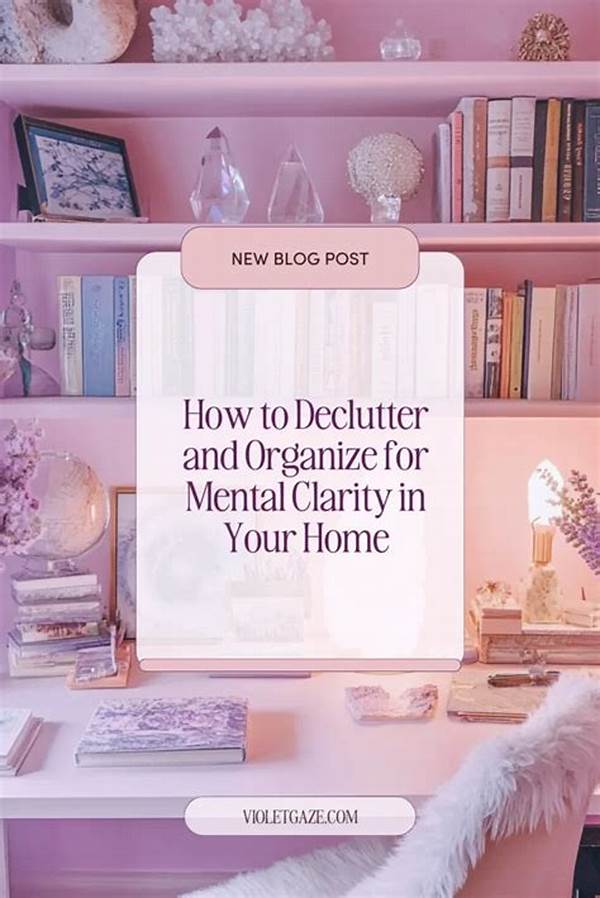Have you ever looked around your home or workspace and felt overwhelmed by the sheer amount of stuff surrounding you? If so, you’re not alone. In today’s fast-paced world, where “more” often seems to be better, our physical environments are becoming increasingly cluttered. But what if I told you that by adopting declutter habits that build mental clarity, you could create not only a tidier space but also a more focused and peaceful mind? It’s true! Cleaning up not only the spaces we inhabit but also our mental and emotional landscapes can lead to greater efficiency, creativity, and serenity.
Read More : Digital Declutter Cal Newport
Decluttering is more than just a trend—it’s a vital practice for mental well-being. Research shows that a cluttered environment can harm mental health, increase stress, and contribute to procrastination. It’s no wonder people are increasingly seeking methods to declutter their lives for better clarity and purpose. Imagine walking into a room where everything has its place, and nothing is holding you back from the tasks you intend to accomplish. This feeling of order can trickle into all areas of life, offering a fresh perspective and enhanced productivity.
But decluttering doesn’t just stop at our physical surroundings. It extends to every aspect of our lives, including our digital world and emotional engagements. Imagine for a moment receiving fewer notifications, reducing screen time, and focusing more on meaningful connections rather than superficial digital engagements. Consider the relief of releasing grudges or negative emotions and focusing instead on growth and positivity. Declutter habits that build mental clarity encompass a holistic approach to well-being, addressing the physical, digital, emotional, and even spiritual clutter that can cloud judgment and joy.
For those skeptical about the declutter revolution, consider how athletes speak of ‘the zone’—a mental state of flow where distractions fall away, and performance peaks. This state of clarity and focus isn’t exclusive to athletes; it’s achievable for all of us through strategic decluttering. Declutter habits that build mental clarity are like the wind that sweeps away the fog, revealing the vibrant landscape of possibilities. Allow this process to guide you toward new heights of mental acuity, balance, and, ultimately, contentment.
The Benefits of Decluttering for Mental Clarity
Decluttering isn’t just about having a neater home—it’s an investment in your mental health. By integrating declutter habits that build mental clarity, you not only clear your physical space but also create a mental environment conducive to peace and concentration. This can significantly reduce stress and anxiety levels, making it easier to navigate daily challenges with a clear and focused mind.
—
Detailed Description of Declutter Habits That Build Mental Clarity
The concept of decluttering is simple, yet its execution can be daunting. However, once you understand the significant benefits tied to declutter habits that build mental clarity, the process becomes both rewarding and essential. Decluttering effectively is about creating habits that are sustainable, which gradually lead to a decrease in unnecessary distractions and an increase in life satisfaction.
Delving into the science of it, several studies indicate that a cluttered environment often leads to decreased productivity and can even heighten depression and anxiety symptoms. This revelation emphasizes the importance of creating a decluttered space to foster mental clarity. As the saying goes, “A tidy desk leads to a tidy mind.” But how exactly do we achieve this nirvana of neatness?
Decluttering isn’t just about making our surroundings look aesthetically pleasing. It’s a strategy for enhancing cognitive function and emotional stability. By clearing out what no longer serves us, we make room for what’s truly important. For instance, organizing your workspace according to the principles of Feng Shui can promote not only physical order but also positive energy flow, which is integral to maintaining mental clarity.
The Psychology Behind Declutter Habits
Digging deeper into the psychological aspect, declutter habits that build mental clarity help to reduce decision fatigue. Every unnecessary item in your environment is a choice you didn’t make, which can add to cognitive load, leading to exhaustion without actual productivity. By minimizing these elements, you save your decision power for what truly matters. It’s like giving your brain a mini-vacation—allowing it to relax and recharge.
Practical Tips for Decluttering
To kickstart your journey, start small. Focus on just one area that needs improvement and take it step by step. Create a system that suits your lifestyle, whether it’s the KonMari Method or another organizing principle. Consistency is key. Make decluttering a regular practice rather than a one-time event. Over time, these habits will naturally bleed into other areas, leading to a more streamlined and focused life.
—
Examples of Declutter Habits That Build Mental Clarity
—
Structure of Decluttering for Mental Efficiency
The journey toward a decluttered life begins with understanding the structure and approach one needs to take. First, there’s the assessment stage, where you identify what areas cause the most stress or inefficiency. It’s an informative phase where one might make lists or draw room layouts to visualize the clutter candidly. A pro tip? Take before photos—future you will want to see the incredible transformation!
After identifying these stress points, the next step is to make informed, strategic decisions about what to keep, donate, discard, or, if you’re feeling really entrepreneurial, even sell. This stage requires brutal honesty; it’s as emotional as it is physical. Here is where you consider the value an object brings versus the space it occupies. It’s like speed dating for your possessions—quickly evaluate how much joy or utility each item brings to your life.
Finally, once the clutter is cleared, maintenance becomes crucial. This phase involves developing and sticking to routines to ensure that clutter doesn’t creep back in. Creating habits like nightly tidy-ups or setting a ‘declutter day’ monthly can prevent regression. Remember, the goal of declutter habits that build mental clarity is not solely a one-time purge but establishing a lifestyle of ongoing simplicity, ready to inspire a clear, sharp mind.
Declutter Habits That Build Both Mental and Emotional Clarity
Taking a step further, decluttering is not just about mental acuity—it has a significant impact on emotional clarity. By confronting the physical clutter, we face emotional souvenirs of the past as well. It’s akin to spring cleaning for your soul, allowing you space to breathe, grow, and focus on emotional health alongside mental acuity.


